Rep. Mick Mulvaney: Hey GOP, Enough Already With the Spending Increases!
- OurStudio

- Mar 30, 2015
- 3 min read

Writing in The Wall Street Journal, Rep. Mick Mulvaney (R-S.C.) slags his own party's House members for passing a budget last week that not only increased spending totals but refused to pay for them by cutting spending elsewhere. In 2011, he notes, Joint Chiefs of Staff Chairman Mike McMullen said that "the most significant threat to our national security is our debt."
Congress took notice and ended up passing the Budget Control Act (BCA), which capped spending and inadvertently led to sequestration (across-the-board cuts to discretionary outlays with…zero serious consequences). But channeling his inner S.E. Hinton, that was then, writes Mulvaney, and this is now:
Four years later, debt and deficits are passé, and the deficit is only a third of what it was just five years ago. Never mind that this year's deficit will be the sixth-largest in history—exceeded only by the previous five—or that the national debt has ballooned by $3 trillion in that time. Today beheadings and racial tension grab the headlines. With fiscal concerns no longer in vogue, House Republicans broke the statutory caps of the Budget Control Act and did so in a way that wasn't honest. Instead of making the arguments for changing the law, the House budget used an off-budget fund, the Overseas Contingency Operations (OCO) budget, to increase military spending.
The OCO should trouble Republicans. The so-called war budget, set up when the U.S. invaded Afghanistan in 2001, has been decried for years as a slush fund, and rightly so. No less a defense hawk than Sen. John McCainhas called it a gimmick. The OCO is perhaps the worst way to fund the military. It lacks oversight and accountability within a Pentagon already famous for its inability to know where the money is going. By far the largest objection is that this additional military spending isn't "paid for."

I appreciate the congressman's penny pinching, but I don't agree with Mulvaney that the largest objection is that new military spending isn't "paid for." As I argued in my discussion of Sen. Rand Paul's amendment to offset military-spending increases in the Senate, the central question is actual whether we need to increase military spending in the first place. With the end of major wars in Iraq and Afghanistan, we should be spending much less than we have been. That's true despite the rise of the Islamic State and the emergence of other flashpoints around the globe. Jumping Jeebus, everyone knows that the Pentagon is one of the most wasteful parts of the government and it's well past time Congress starts doing something to rein in totally useless spending boondoggles and standard-operating procedures that produce debacles such as the F-35 ripoff. And it's worth noting that most tallies of defense spending are talking about a baseline Department of Defense budget plus the OCO costs. Yet the true amounts that get spend on defense and homeland security are in fact much higher. Mulvaney again:
Until this budget, Republicans were beginning to convince people that they were serious about reducing spending. GOP budgets in recent years have made hard decisions on everything from defense to Medicare to food stamps. Republicans had begun making the argument that all spending is subject to scrutiny. Now there is a new message: Republicans will cut things they don't like, but they lack that same conviction on things they like.
Yeah, no. The main reason that federal spending flatlined after 2010 was because George Bush (remember TARP?) and Barack Obama in 2009 kicked out the jams on spending so bad that Congress called a time-out. Gridlock won out over directed action. Members of the GOP establishment have been bitching and moaning about budget caps and the need for more defense spending ever since and the bipartisan deal brokered by Rep. Paul Ryan (R-Wis.) and Sen. Patty Murray (D-Wash.) allowed for busting through the caps temporarily. As for the "hard decisions" the GOP has made to reel in spending, that all remains to be seen. The same attempt to cut food stamps, after all, saved farm subsidies (in a slightly different and possibly more noxious). Why is it always easier to cull benefits for the poor (not that such benefits only go to the poor) than to agribusiness? As for Medicare, let's be clear: The GOP has yet to be serious about reining in the growth of a program that more than any other formed the basis of Adm. McMullen's complaint about debt.
If fiscal hawks were truly serious about cutting the size, scope, and spending of government, as Mulvaney and Sens. Paul and Ted Cruz claim to be, they would be pushing for reductions in the defense budget, one of the single-biggest items in the federal budget.
Don't get me wrong. It's great that Mulvaney is calling bullshit on his House colleagues (only 16 other Republicans joined him) and it's nice that Paul and Cruz voted against the Senate budget resolution (as Matt Welch noted earlier today, they were the only Republicans to do so). But to the extent that these guys countenance any situation in which the U.S. must needs be spending more on defense—and more in general—they are leaving way too much money on the table.




Comments